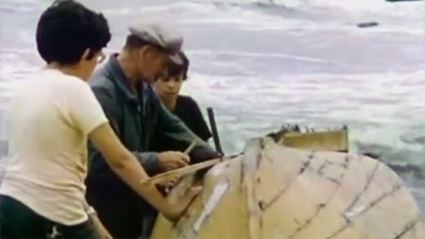The main characters of the TV series Vasko da Gama ot Selo Rupcha - Vasko, Zhenya, Fori and their classmates from the 7th B Grade were about to face this reality, but before that they experienced an unforgettable summer at the sea shore filled with tomfooleries, bombastic bets and tireless rivalry, linked with the first love thrills.  Vasko was a lively and intelligent child. His father worked as a sailor and his mother was pregnant with her third child. He was roaming across the streets of Bulgaria's sea capital Varna with his friend Zhenya and tried to conquer the heart of a girl named Tincheto. Zhenya was a plump guy, a son of Bulgarian conductor who often punished his sluggish son with his baton. Zhenya liked to eat, wander around the streets with Vasko and do a lot of fooleries with him. The story of the TV series circulated around a leaky boat. When Vasko and Zhenya found that boat, they decided to repair it, but needed some money for the purpose. However, Vasko's rival Fori was the only one who could find enough money. The armistice between the two boys lasted until they tried to sail the boat. Unfortunately, the boat sank, because it was covered with dozens of holes. Later, the rivalry between Vasko and Fori resumed.
Vasko was a lively and intelligent child. His father worked as a sailor and his mother was pregnant with her third child. He was roaming across the streets of Bulgaria's sea capital Varna with his friend Zhenya and tried to conquer the heart of a girl named Tincheto. Zhenya was a plump guy, a son of Bulgarian conductor who often punished his sluggish son with his baton. Zhenya liked to eat, wander around the streets with Vasko and do a lot of fooleries with him. The story of the TV series circulated around a leaky boat. When Vasko and Zhenya found that boat, they decided to repair it, but needed some money for the purpose. However, Vasko's rival Fori was the only one who could find enough money. The armistice between the two boys lasted until they tried to sail the boat. Unfortunately, the boat sank, because it was covered with dozens of holes. Later, the rivalry between Vasko and Fori resumed.
To make the whole story more intriguing Zhenya decided to run away from home. In protest against his masterful father, he offered Vasko to sail away with him. Vasko's father and Zhenya's brother worked on the Elena ship, which was meant to take the children away from home. However, Zhenya was filled with fear in the last moment and Vasko sneaked onto the ship alone, wearing a suitcase and his friend's guitar. And he sailed away indeed! The boy's adventure ended well, although not the way he planned. Later…the summer ended and Vasko, Zhenya and Fori went again to school and their summer experience remained in their memories only.
Celebrated Bulgarian actor Ivan Laskin who studied back then at the Seventh High School in Sofia played his first main role in these TV series. During the shooting of the series he missed classes for nearly two and a half years and provoked the jealousy of his classmates. He was the only child from the TV series Vasko Da Gama ot Selo Rupcha who continued his career in cinema and theatre and later became one of the most popular Bulgarian actors, although he is known for his knotty character. Georgi Markov was Fori in these series, who later graduated cinematography at the National Academy for Theatre and Film Arts. Now he is a popular director of music videos, cameraman and photographer.
English version: Kostadin AtanasovBulgaria had no Prague Spring, no Tender Revolution, no Solidarity movement, nor huge dissidents like Havel and Wałęsa. The main reasons are the psychology of the Bulgarian people and the repressions against the intellectual elite..
Reciting his poem An Interview in the Whale's Womb, Pavlov went on to say: „To enter the whale's womb you should prove you've got worth. There is 'worth' control… There I first met Valery Petrov, and say, Boris Hristov met me…”..
“Europe in anything other than the geographical sense is a wholly artificial construct.” Sobering words, especially coming from Margaret Thatcher in her book Statecraft. In the 1980s, the Iron Lady dragged Britain out of the..

+359 2 9336 661
